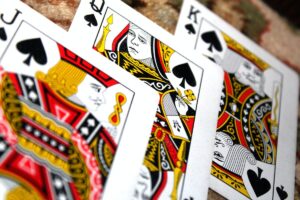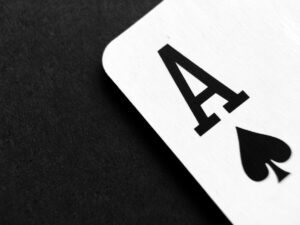 Popularly known as the ‘Vegas Vixen’, Ida Summers was a petite, attractive woman and, as such, was hardly an archetypal cheat, and particularly not in Las Vegas in the Mafia-dominated days of the Sixties and Seventies. However, a bold, skilful and, ultimately, notorious cheat she was, employing distraction and sleight-of-hand techniques to swindle casino blackjack tables out of tens of thousands of dollars.
Popularly known as the ‘Vegas Vixen’, Ida Summers was a petite, attractive woman and, as such, was hardly an archetypal cheat, and particularly not in Las Vegas in the Mafia-dominated days of the Sixties and Seventies. However, a bold, skilful and, ultimately, notorious cheat she was, employing distraction and sleight-of-hand techniques to swindle casino blackjack tables out of tens of thousands of dollars.
Reputedly from Newport, Kentucky, Summers moved to Las Vegas in 1961, by which time she had already mastered the technique of ‘hand mucking’, which involves concealing a favourable card, such as an ace, in the palm of the hand and surreptitiously substituting it for a less favourable card as an when required. This type of deception provided Summers with easy pickings but, later, she took her cheating activity to another level, by recruiting male accomplices to help her substitute not just a single card, but the whole blackjack shoe.
At an opportune moment, when the dealer was distracted, Summers would lift the original shoe off the blackjack table and conceal it in her lap, while a pre-stacked shoe, known as a ‘cooler’, was slipped onto the table in its place. She would offload the original shoe to a standing accomplice and make herself scarce at the earliest opportunity, leaving her remaining seated accomplices to take advantage of a series of guaranteed winning hands, albeit with a few losing hands thrown in, for good effect. Eventually, Summers became the subject of a surveillance operation conducted, jointly, by the Nevada Gaming Control Board and the FBI; although ultimately betrayed by a former accomplice, was sentenced to just twelve months’ probation.
 The late Fouad al-Zayat, who died in Lebanon in 2018 at the age of 77, was a Syrian-born businessman, known in casino circles as the ‘Fat Man’. A prolific, but secretive, gambler, the twenty-stone billionaire regularly frequented Aspinalls Club in Mayfair, in the West End of London between 1994 and 2006. Initially, al-Zayat gambled tens, or hundreds, of thousands of pounds in a single visit but, towards the turn of the century, satisfied the definition of a high roller, or ‘whale’ in casino industry parlance, by raising his stakes to a million pounds, or more, in a single visit.
The late Fouad al-Zayat, who died in Lebanon in 2018 at the age of 77, was a Syrian-born businessman, known in casino circles as the ‘Fat Man’. A prolific, but secretive, gambler, the twenty-stone billionaire regularly frequented Aspinalls Club in Mayfair, in the West End of London between 1994 and 2006. Initially, al-Zayat gambled tens, or hundreds, of thousands of pounds in a single visit but, towards the turn of the century, satisfied the definition of a high roller, or ‘whale’ in casino industry parlance, by raising his stakes to a million pounds, or more, in a single visit.
All told, in a twelve-year period, al-Zayat gambled £91.5 million at Aspinalls, losing £23.2 million, or 25% of his stake money. However, in March, 2000, al-Zayat drew four house checks for £500,000 apiece and lost all £2 million playing blackjack. He subsequently cancelled a cheque for £2 million, following a row over a croupier and, in 2006, Aspinalls sued him for that amount, plus £50,000 in costs. Initially, al-Zayat was ordered to repay the debt, but successfully appealed to the High Court on the grounds that Aspinalls had allowed him to defer payment for twelve months and, thereby, effectively allowed him credit that was illegal under the Gaming Act. The High Court judge agreed and the original ruling was overturned, effectively wiping out the debt. In 2015, al-Zayat was tried in absentia, convicted and sentenced to life imprisonment for bribery in Greece and, at the time of his death, was also wanted for fraud in Cyprus.
 The late Thomas Austin Preston, Jr., popularly known as ‘Amarillo Slim’, who died in 2012 at the age of 83, was arguably the most famous poker player of the twentieth century. Born in Johnson, Arkansas on New Year’s Eve, 1928, Preston moved to Amarillo, Texas to live with his father, Thomas Preston, Snr., at the age of 16, following the divorce of his parents.
The late Thomas Austin Preston, Jr., popularly known as ‘Amarillo Slim’, who died in 2012 at the age of 83, was arguably the most famous poker player of the twentieth century. Born in Johnson, Arkansas on New Year’s Eve, 1928, Preston moved to Amarillo, Texas to live with his father, Thomas Preston, Snr., at the age of 16, following the divorce of his parents.
The following year, Preston enlisted in the Navy, but spent much of his time as a bluejacket hustling in pool halls on the West Coast, which is where his nickname originated. Indeed, such was his aptitude as a ‘road warrior’ that, when he left the Navy three years later, he had over $100,000 to his name. However, by his own admission, he had lost it all within a year.
Later in his career, from 1964 onwards, Preston travelled the Southwestern United States, playing ‘underground’ poker alongside Doyle ‘Texas Dolly’ Brunson and Brian ‘Sailor’ Roberts. However, in 1972, Preston beat Walter ‘Puggy’ Pearson to win the Main Event of the World Series of Poker (WSOP) at Binion’s Horseshoe in Downtown Las Vegas and, together with $80,000 in prize money, the unofficial title of ‘World Champion’.
Preston subsequently became an international celebrity and made regular appearances on television programmes, including ‘The Tonight Show Starring Johnny Carson’. Indeed, he is credited with starting poker, especially his favourite variant, Texas Hold’em, on the road to respectability. All told, Preston won five 22-carat WSOP gold bracelets and in excess of $500,000 in tournament earnings during his career. He was inducted into the Poker Hall of Fame, created by Benny Binion in 1979, in 1992.
